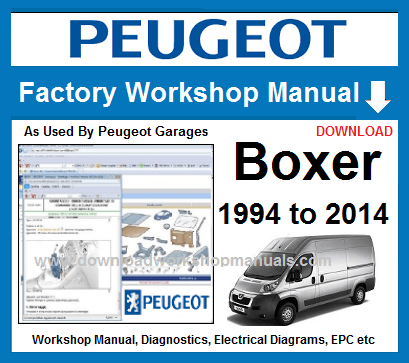
Peugeot Workshop Owners Manuals and Free Repair Document Downloads. Please select your Peugeot Vehicle below.
| Search service manual |
Peugeot Boxer Workshop Repair Manual Download
Peugeot Boxer car list model manual
Workshop Manual Free
| Brand | Model | Version | Engine | Engine Type | Fuel | HP | MY | ECU | ECU Type |
| eugeot | Boxer | 2000 HDI | RHV (DW10UTD) | Diesel | 84 | 2001 | BOSCH | EDC15 C2 | |
| Peugeot | Boxer | 2800 HDI | 8140.43S | Diesel | 128 | 2000 | BOSCH | EDC15 C7 | |
| Peugeot | Boxer | (II) | 2000 8v | RFL | Petrol | 110 | 2002 | MARELLI | IAW 48P2 |
| Peugeot | Boxer | (II) | 2000 HDI | RHV (DW10UTD) | Diesel | 84 | 2002 | BOSCH | EDC15 C2 |
| Peugeot | Boxer | (II) | 2200 HDI | 4HY (DW12UTED) | Diesel | 100 | 2002 | VISTEON | DCU102 |
| Peugeot | Boxer | (II) | 2800 HDI | 8140.43N | Diesel | 145 | 2004 | BOSCH | EDC15 C7 |
| Peugeot | Boxer | (II) | 2800 HDI | 8140.43S | Diesel | 128 | 2002 | BOSCH | EDC15 C7 |
| Peugeot | Boxer | (III) | 2200 HDI | 4HU (P22DTE) | Diesel | 120 | 2006 | VISTEON | DCU102 |
| Peugeot | Boxer | (III) | 2200 HDI | 4HV (P22DTE) | Diesel | 100 | 2006 | VISTEON | DCU102 |
| Peugeot | Boxer | (III) | 3000 HDI | Diesel | 175 | 2011 | BOSCH | EDC17 CP52 | |
| Peugeot | Boxer | (III) | 3000 HDI | F1CE0481D | Diesel | 160 | 2006 | BOSCH | EDC16 C39 |
| Peugeot Boxer manual service manual maintenance car repair manual workshop manual diagram owner's manual user manuals pdf download free, source of service information, technical specifications, and wiring schematics for the Peugeot Boxer. Whether you’re a repair professional or a do-it-yourself Peugeot Boxer owner, this manual will help you understand, care for and repair your Peugeot Boxer. This repair manual will help you to perform all the main maintenance and repair work correctly and efficiently. It should be consulted regularly by workshop personnel as an addition to the practical and theoretical knowledge obtained in Training School courses. It is a contribution towards achieving even higher Service quality. Proper service and repair is important to the safe, reliable operation of all motor vehicles or driving axles whether they be front or rear. The service procedures recommended and described in this service manual are effective methods for performing service operations. Some of these service operations require the use of tools specially designed for the purpose. The special tool should be used when and as recommended.CAUTION: EXTREME CARE SHOULD BE EXERCISED WHEN WORKING ON COMPO-NENTS UTILIZING SNAP RINGS OR SPRING LOADED RETENTION DEVICES. FOR PERSONAL SAFETY, IT IS RECOMMENDED THAT INDUSTRIAL STRENGTH SAFETY GOGGLES OR GLASSES BE WORN WHENEVER REPAIR WORK IS BEING DONE ON ANY VEHICLE OR VEHICLE COMPONENTS. It is impossible to know, evaluate and advise the service trade of all conceivable ways in which service might be done or of the possible hazardous consequences of each way. Accordingly, anyone who uses a service procedure or tool which is not recommended must first satisfy himself thoroughly that neither his safety or vehicle safety will be jeopardized by the service methods he selects. Precautions It is necessary to take extra care when working on the electrical system to avoid damage to semi-conductor devices (diodes and transistors) and to avoid the risk of personal injury. In addition to the precautions given in the “Safety first!” Section at the beginning of this manual, take note of the following points when working on the system. a) Before disconnecting any wiring or removing components, always ensure that the ignition is switched off. b) Disconnect the battery leads before using a mains charger. c) Do not reverse the battery connections. Components such as the alternator or any other having semi-conductor circuitry could be irreparably damaged. d) If the engine is being started using jump leads and a slave battery, connect the batteries positive to positive and negative to negative. This also applies when connecting a battery charger. e) Never disconnect the battery terminals or alternator multi-plug connector when the engine is running. f) The battery leads and alternator multiplug must be disconnected before carrying out any electric welding on the vehicle. g) Never use an ohmmeter of the type incorporating a hand cranked generator for circuit or continuity testing. h) When carrying out welding operations on the vehicle using electric welding equipment, disconnect the battery and alternator. i) When fitting electrical accessories it is important that they are connected correctly, otherwise serious damage may result to the components concerned.
|